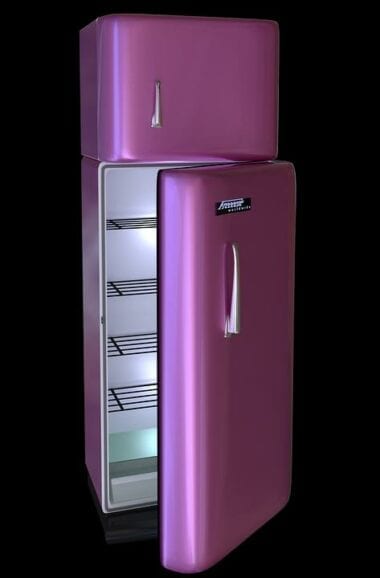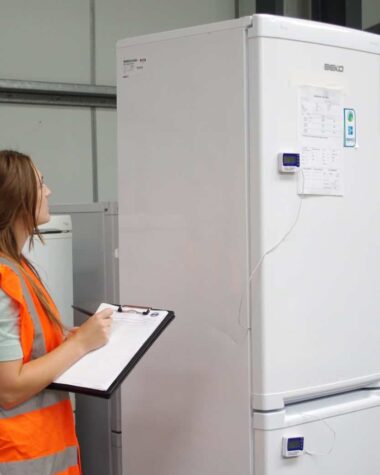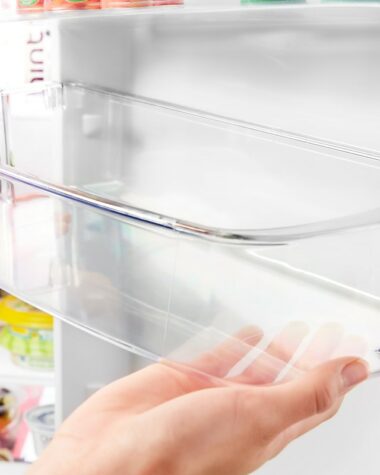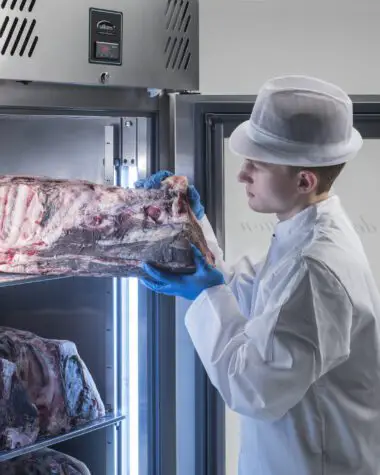Do you own a propane refrigerator? If you have not seen them, you might wonder how they’re supposed to work.
In this blog post, we here at DaDongNY will go over how these refrigerators work in in-depth detail. We’ll also go through the advantages of implementing a propane refrigerator and debunk some of the myths associated with them.
With this, you will have a better understanding of how these pieces of equipment work and whether they would be suitable for your home’s needs by the conclusion of this post!
What Exactly Is A Propane Refrigerator?
A propane refrigerator is a certain kind of refrigerator that feeds on propane as its main source of energy. Propane freezers are common amongst campers and RV owners given that they are often powered by propane tanks, which are present in these vehicles.
Propane refrigerators are available in both absorption and compressor variants. To chill the refrigerator, absorption variants use a chemical process, whereas compressor variants use a typical refrigeration system.
Propane refrigerators are a bit more expensive than conventional refrigerators, but they have some advantages. As an example, propane refrigerators do not require an electrical connection. This indicates that they can be used in remote areas in which there is no electricity present in the vicinity.
One more advantage of propane refrigerators is the way they use less energy compared to electric refrigerators. This is because propane is a far more effective source of energy than electricity. In addition, propane refrigerators have a longer lifespan as compared to electric refrigerators.
The Science Behind A Propane Refrigerator
A propane refrigerator is an excellent alternative for persons who live in remote areas or who want to live an off-grid lifestyle. You won’t need to be mindful of power outages or fluctuations within your backup power supply, which could cause your refrigerator to stop working down and break down the food. Furthermore, RV owners, campers, compact homeowners, fishing camps, wilderness resorts, and other individuals opt for propane refrigerators.
They usually work using a unique process known as absorption refrigeration, which involves:
| Steps | Procedure |
|---|---|
| Step 1 | A propane generator generates the energy required to heat an ammonia and water-filled chamber inside the refrigerator. |
| Step 2 | The ammonia gas flows into a condenser when the liquid boils and cools down. |
| Step 3 | The liquid ammonia is then pumped through an evaporator carrying hydrogen gas. |
| Step 4 | When hydrogen gas and ammonia interact, a chemical reaction occurs that absorbs heat. The heat is drawn from within the refrigerator box, cooling the internal components of the refrigerator. As a result, rather than blowing cold air into the equipment, heat is extracted. |
| Step 5 | Ammonia is converted back into a gas during the process, and the mixture of ammonia and hydrogen gas goes to a chamber wherein it is merged with water. |
| Step 6 | The ammonia-based gas dissolves in the solution of water, and the hydrogen gas returns to the evaporator to be reused. |
| Step 7 | The cycle begins again with the help of the water and ammonia solution. |
Is It Safe To Use Propane Refrigerators?
To put it simply, yes. Propane refrigerators are safe to use, particularly within remote regions. It is safe to use the propane refrigerator since the flame is contained in a stainless steel burner box as well as is well-equipped with a thermocouple. The thermocouple shuts off the propane fully when the flame goes out.
Operating a propane fridge, on the other hand, can be hazardous in poorly ventilated spaces. It emits carbon monoxide, which can be toxic if released in a confined area. As a result, when using a propane refrigerator, open the RV’s vents or keep a window open for the gas to escape.
Evaluate your propane refrigerator to see the extent to which your windows or vents must be opened. This part varies depending on the model of your refrigerator and the camper you use. On average, no less than 12 square inches of free space is required, particularly near the exhaust origin. Make sure you have plenty of open spaces to avoid asphyxiation as well as carbon monoxide poisoning.
In addition, have a carbon monoxide detector at all times. If the propane refrigerator isn’t working properly, this detector will notify you. It will also notify you if you’re experiencing a gas leak. If you find a problem someplace, fix it right away or disconnect it.
What Temperature Can A Propane Refrigerator Reach?
A propane refrigerator may reach temperatures as low as -5 °F. However, the desired temperature is determined by the heating elements placed in the refrigerator. The fridge cools faster when the heating element is hotter.
Take note that the propane freezer above your refrigerator starts the cooling process. However, controlling the temperature of the freezer is more difficult. The freezer will keep up the temperature conveyed by the heating element.
For example, if the desired temperature for the refrigerator compartment is 34 to 36 °F, the freezer section will continue to maintain a temperature range of -5 to 10 °F. However, if the ambient temperature inside your propane refrigerator is between 38 and 40 °F, the temperature in the freezer drops by 5 to 10 °F.
Why Do Propane Refrigerators Cost So Much?
Propane refrigerators cost more than electric refrigerators. A propane refrigerator is more economical to buy compared to an electric refrigerator. Furthermore, propane refrigerators have cheaper operating expenses, lower fuel use, and a longer lifespan.
The following explains why propane refrigerators are so expensive:
- Propane refrigerators are free of moving parts. As a result, there will be little mechanical as well as technical wear and tear damage. As a result, it would keep working smoothly for an extensive amount of time with minimal upkeep needs.
- Propane refrigerators consume a smaller amount of fuel. The latest innovation used to manufacture propane refrigerators allows the machine to run on less energy and emit less pollution. Such a feature will help you save money in the long run.
- Propane refrigerators have a longer lifespan than electric refrigerators. While certain components have varying lifespans, propane ones outlast a standard refrigerator.
- Propane is manufactured in the United States. As a result, the operating cost of a propane refrigerator is cheaper than that of an electric refrigerator. This lowers the overall operating cost of a propane refrigerator.
Propane Refrigerators vs. Electric Refrigerators: Which One Is Better?
The debate surrounding propane and electric refrigerators is strong. Propane refrigerators have a high maintenance rating. They require less maintenance than electric refrigerators. , Unlike electric refrigerators, these refrigerators survive longer since they have no moving parts to worry about. Electric refrigerators, on the other hand, outperform propane refrigerators in terms of performance, safety, and adaptability.
Learn more about refrigerators powered by propane vs. electricity below:
- Performance
Electric refrigerators trump propane refrigerators in terms of performance. These refrigerators, unlike the propane ones, do not rely on variable air temperature. They also regulate the internal temperature through direct currents.
- Efficiency
Electric refrigerators use less energy than propane refrigerators. The electric refrigerator is powered by direct current, which is safer and more effective than propane, which is used to power propane refrigerators. A propane fridge, on the other hand, consumes less energy. A 20-pound gas tank, for example, can power the fridge for around 2 days if used often.
- Convenience
Electric refrigerators are more convenient when compared to propane refrigerators. In a power outage, it is easier to start and run an electric refrigerator than it is to operate a propane refrigerator. By using an electric refrigerator, you also don’t have to worry about switching the gas on or off periodically. All you have to do is plug it in, and you’re ready to go.
Furthermore, electric refrigerators come in a variety of power configurations. You have the option of using a power source or a generator. The propane fridge, on the other hand, has only one power source: the gas tank. If you happen to run out of propane, you won’t be able to use your propane fridge.
- Versatility
Electric refrigerators are more versatile than propane refrigerators. To power an electric fridge, you can utilize a power outlet or a generator. On the other side, you must rely on propane tanks for powering your propane refrigerator.
- Safety
Propane is a volatile natural gas with poisonous and explosive properties. Mishandling can lead to explosions and harm. While electricity may result in shock, fire incidents, or component wreckage, it is far safer than propane. Thus, electric refrigerators are far superior to propane refrigerators in terms of safety.
| Criteria | Propane Refrigerators | Electric Refrigerators |
|---|---|---|
| Performance | Has a strong performance. Nonetheless, it trails behind the electric refrigerator | Has superior performance |
| Efficiency | Is less energy efficient than electric refrigerators | More efficient |
| Convenience | Is less practical | Is more practical |
| Versatility | Has few alternatives | More flexible choices |
| Safety | Though leaks can cause CO poisoning, they are safe | When handled incorrectly, safer can cause electric shock |
FAQs
- Is It Better To Have A Propane Or An Electric As A Rv Refrigerator?
This is a frequently asked question among RVers. However, the answer is more complex than you may expect. In general, propane is the preferred option for RV refrigerator power. However, there are some considerations you must make before deciding.
One aspect to consider is the expenditure of propane versus electricity. Propane is often less expensive than electricity, so if money is an issue, propane may be the best way to go. Another consideration is the need for more power sources.
You will need a propane tank if you are boondocking. However, if you stay at a campground with connections, you will almost certainly have a supply of electricity.
Furthermore, the best choice for fueling your RV refrigerator is the one that most effectively meets your specific requirements. Think about what is essential to you and base your decision on that.
- How Long Does A Refrigerator In An Rv Use Propane To Get Cold?
On propane, it can take some time for an RV refrigerator to get cold. The refrigerator will cool down faster in cold weather. In general, an RV fridge on propane takes around two hours to get cold in temperatures under 50 degrees Fahrenheit.
However, in extremely cold temperatures, the fridge may take a maximum of four hours to cool. If you use an RV fridge in really hot weather, it might need less time to chill down. You may aid the process by leaving the door slightly open so that air flows inside.
If you want your RV fridge to cool down quickly, you may need a block of ice or ice cubes to help. Just put the ice in the refrigerator and shut the door.
The ice will help cool the air within the refrigerator and make it easier for it to achieve the correct temperature. Simply keep an eye on the ice and refill it as needed to prevent it from melting and causing water to cause harm to your refrigerator.
Bottomline
To end this article, a propane refrigerator operates by cooling the air inside the refrigerator to a temperature lower than the dew point. Water vapor from the air condenses on the cool coils and is sucked off into a pan to dissipate.
This procedure is repeated until the appropriate temperature is obtained. Propane refrigerators are a cost-effective and effective way to keep food and beverages cool.
We hope you found this to be informative and useful. To learn more about refrigerators and how this valuable piece of equipment chills the food and beverages inside, including your breast milk, check out the post here.
Articles You May Be Interested In
- A Cooler Choice: Whirlpool v.s GE Refrigerators (Full Guide)
- Refrigerator Check: LG v.s Samsung Refrigerators (Full Guide)
- Cool Tech Showdown: Frigidaire v.s Whirlpool Refrigerators (Full Guide)
- Fridge Favorites: Bosch v.s LG Refrigerators (Full Guide)
- Cooling Conundrum: Whirlpool v.s Samsung Refrigerators (Full Guide)
- Tale Of The Tape: Maytag v.s Whirlpool Refrigerators (Full Guide)
- Fridges in Focus: Thermador v.s Sub-Zero Refrigerators (Full Guide)
- Fridge Frenzy: Sub-Zero v.s Viking Refrigerators (Full Guide)
- The Big Chill: Whirlpool v.s KitchenAid Refrigerators (Full Guide)
- Refrigerator Bout: Whirlpool v.s LG Refrigerators (Full Guide)










